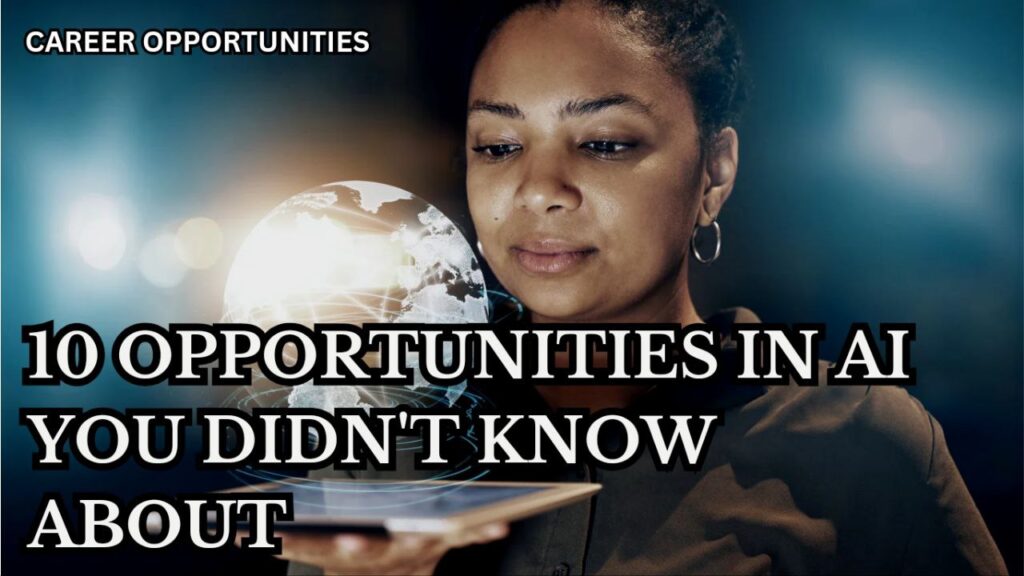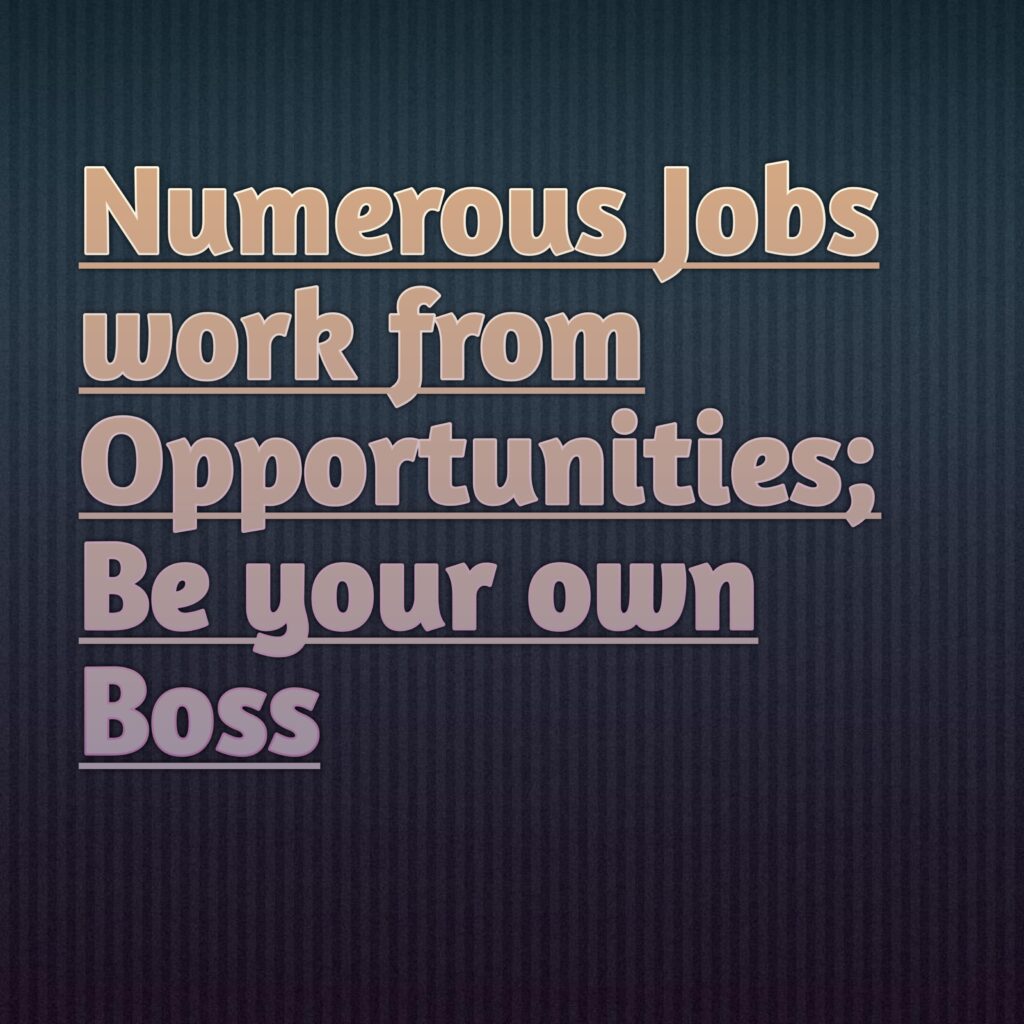
Table of Contents
Introduction
Professionals are afraid of robotic process automation because it has the potential to displace many human employees. Because of this, a lot of tech-savvy people steer clear of AI careers out of fear that machines may eventually replace them. In actuality, machines perform a wide range of tasks faster, more accurately, and more consistently than people. However, machines are still limited in certain ways. And in the labour market, the human mind can take advantage of this constraint.
In this article, we discuss 10 AI career opportunities you probably aren’t aware of.
10 Opportunities in AI
1. Machine Learning Engineer
Machine learning engineers are highly sought after. They earn an estimated median salary of $114,856 yearly. Machine learning engineers are typically responsible for designing and managing platforms for machine learning projects.
Machine learning engineers play a role that is at the heart of every artificial intelligence project. It is best executed by those who have a background in applied research and data science. Additionally, there is the need for a prospective machine learning engineer to have a thorough understanding of multiple programming languages and be an AI programmer. A machine-learning engineer should also be able to work with predictive models and manipulate natural language processing in working with massive datasets
Companies typically look for candidates who are highly experienced agile development practices and have a good understanding of leading software development ide tools.
2. Data Scientist
As a data scientist you are responsible for collecting, analyzing, and interpreting large, complex data sets by the use of predictive analytics and machine learning. Data scientist also plays a leading role in developing algorithms to be use in collecting and cleaning of data for analysis. The average annual earning of data scientist is $120,931. To be successful in the type of data science a candidate should have good command of big data platforms and tools like, hive, Hadoop, MapReduce, pig, and spark.
The data scientist should also have good experience with statistical computing languages and programming languages like Perl, Python, Scala, and SQL. A data scientist to mental health good analytical and communication skills in order to communicate their findings properly business leaders.
3. Business Intelligence Developer
Business intelligence developer is one of the top carrier in artificial intelligence. The primary role of a business intelligence developer is to analyze complex data sets for business and market trends. This whole game froze the efficiency and profitability of the business and that makes it one of the case in high demand today with an annual median salary of $92,278.
To do this job well you need to have strong technical and analytical skills. You should also be able to communicate with non-tech savvy college and demonstrate strong problem-solving skills. A business intelligence developer is typically required to have a bachelor’s degree in engineering computer science or related field however combining one or more of these qualifications with on-the-job experience will be an added advantage.
4. Research Scientist
Research scientist is one of the leading careers in artificial intelligence. The research scientist is typically an expert in multiple artificial intelligent disobedience like applied mathematics, machine learning, deep learning, and computational statistics. For a candidate to stand a good chance of being hired they must demonstrate the proper knowledge and experience in computer perception, graphical models, reinforcement learning, and natural language processing. The average annual salary of a research scientist is about a hundred thousand dollars.
5. Big Data Engineer/Architect
Big data engineers and architects are among the highest-paid experts in the field of AI. They make an average of $151,000 annually. These engineers play a vital role in developing an expert system that allows business systems to communicate with each other and collate data. Most employers prefer experts that have a PhD in mathematics computer science or a related field. Big data engineers and architects are defined by data scientists in that their work is more involved since they are tasked with planning, designing, and developing the big data environment on Hadoop and spark systems.
Candidates of big data engineering and architecture have to demonstrate significant programming experience with C++, java, Python, and Scala. They are also expected to have in-depth knowledge and experience of data mining, data visualization, and data migration.
6. Computer Vision Engineer
Computer vision refers to the ability of computers to not only see images but also make some sort of sense out of those images, like detecting movements and determining distances. The technology has applications in medicine, defense, manufacturing, and many more.
The work of a computer vision engineer has to do it applying computer vision research that is based on a large amount of data to solve practical problems. Do you say engineers spend a lot of time working on research and implementation of machine learning primitives and computer vision for companies? The collaborate with other artificial intelligence experts to facilitate the implementation of novel embedded architectures. To succeed as a computer vision engineer why should have considerable experience with a number of systems such as image recognition machine learning and segmentation.
To pursue a career in computer vision engineer you will first need to obtain a bachelor’s degree in computer science, information system, or other similar disciplines. Then you will obtain the master’s degree in computer science or computer engineering preferably specializing in a relevant course.
7. Algorithm Developer
The major work of an algorithm developer typically involves researching, writing and performance testing algorithms. They are responsible for working to implement algorithms and then analyze and modify them as required. Algorithms generally use delta from a system to execute actions processes or reports. So that means each algorithm you built must first take into account the goals and then work to achieve specific results. It is common to see algorithm developers collaborate with a team in creating theories and then performing research and test until the perfect and efficient algorithm.
to succeed this kind of job you need understanding of r and C++ and Python optionally. If the employer requires that you have knowledge and experience in neutral nets, then at least a bachelor’s degree in mathematics, computer science or related fields is a necessity.
8. Developer Consultant
In the world of software development, a consultant’s job is to help others be their best. The consultants work with an individual or team to help detect problems, identify strengths and areas of improvement. On the other hand, a developer consultant is responsible for a number of things that may involve coding as well. For example, a developer consultant may write code, manage projects, create stories, facilitate retrospectives, improve business processes, host iteration panning meetings, convey the values of paying down technical debt, play QA/tester roles, etc. His main mission is to elevate the abilities of the team.
To work as a developer consultant, you need to work for a software consultant company that hires you out from time to time or regularly. For example, you could be working for oracle and some large company may need assistance to set up middleware. Your permanent employer (in this case oracle) hires you out on a contract basis to assist the company.
10. User Experience
The job of a UX involves working with products, even those that incorporate AI, to ensure that consumers understand how to use them. This role traditionally existed outside of the AI sector, but as the use of AI technologies continue to grow, there is increasing demand for UX specialists that are trained for UX jobs within an AI framework.
As a user experience specialist, you are in charge of understanding how humans use equipment. What you discover will help computer scientists apply modifications that lead to the production of more advanced software. In the context of AI, the roles of a UX engineers may include understanding how humans are interacting with these tools in order to develop functionality that better serve them.
Among the most prominent examples of how user experience involves technology is the case of apple Inc. The mac OS was developed in order to solve the user experience of complexity regarding windows OS. To use the windows OS effectively, a user requires more advanced technical understanding than if they use mac. In the same manner, apple developed the iPhone. iPhone focuses on improving user experience by understanding how people interact with their phones, including what is intuitive and what is not. With this understand, iPhone designed the best phone they could to meet this need.
Conclusion
Since artificial intelligence is a huge and constantly growing field, we have not included all of the exciting employment options in this post. Some will phase out, and new ones will keep coming up. It is crucial for you to stay up-to-date on industry developments in fields that interest you as a potential AI specialist, as these developments will directly impact the kind of skills that will be required in the near future. You might also follow developments in the field of AI research.
For more information, read this article from Elite AI Global on LinkedIn.
You can also see:
British Institute In East Africa BIEA Graduate Attachment Scheme 2024/2025
University of Milan Scholarship 2024-25: Apply Now!
AWIEF Nedbank Growth Accelerator Grant for South Africa 2024: Apply Now!
Writing Compelling Personal Essays for Scholarship Applications in 2024 and Beyond





